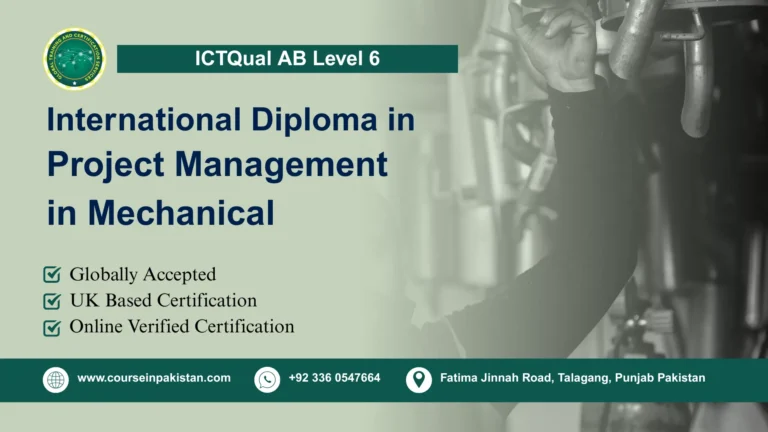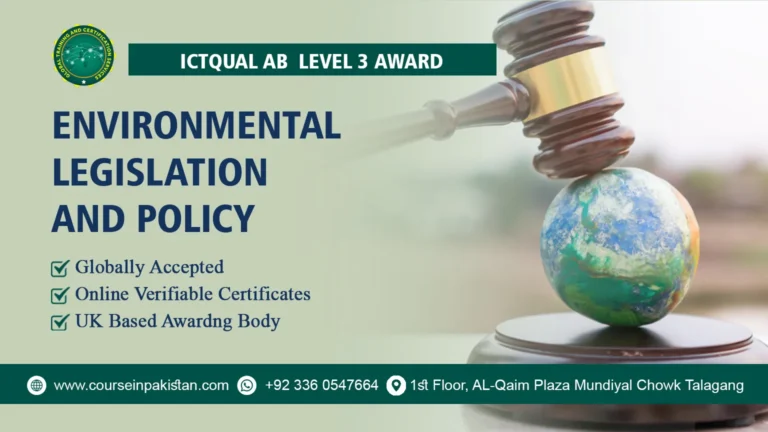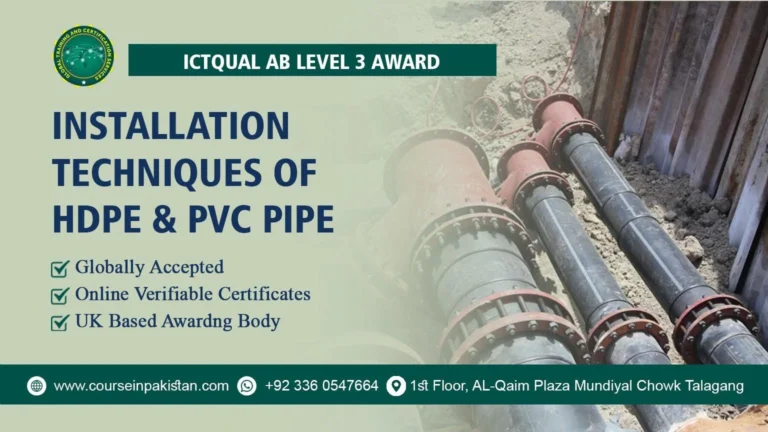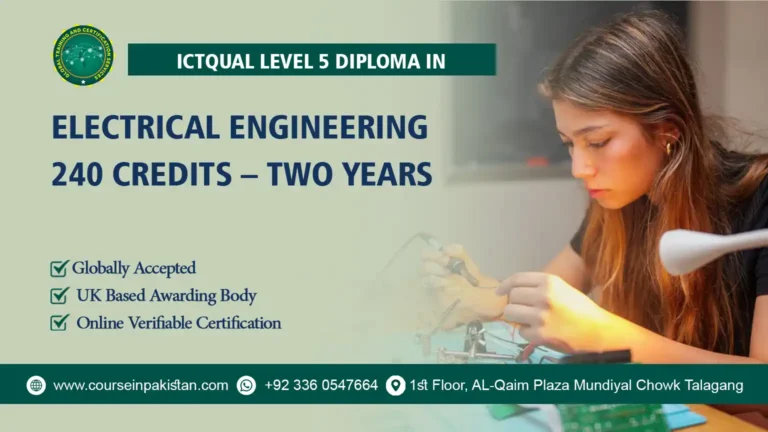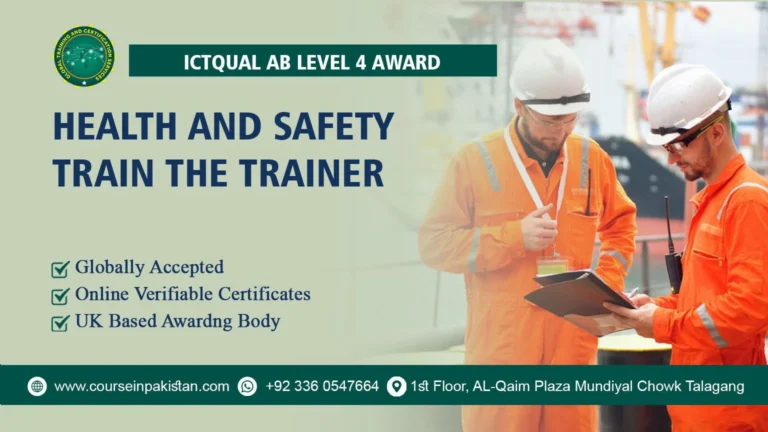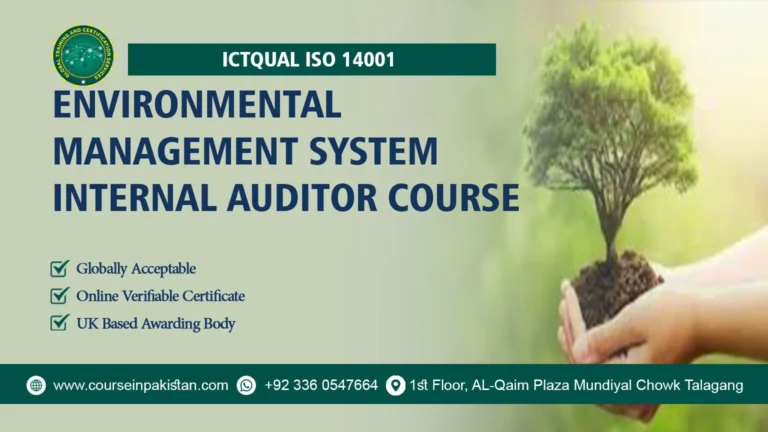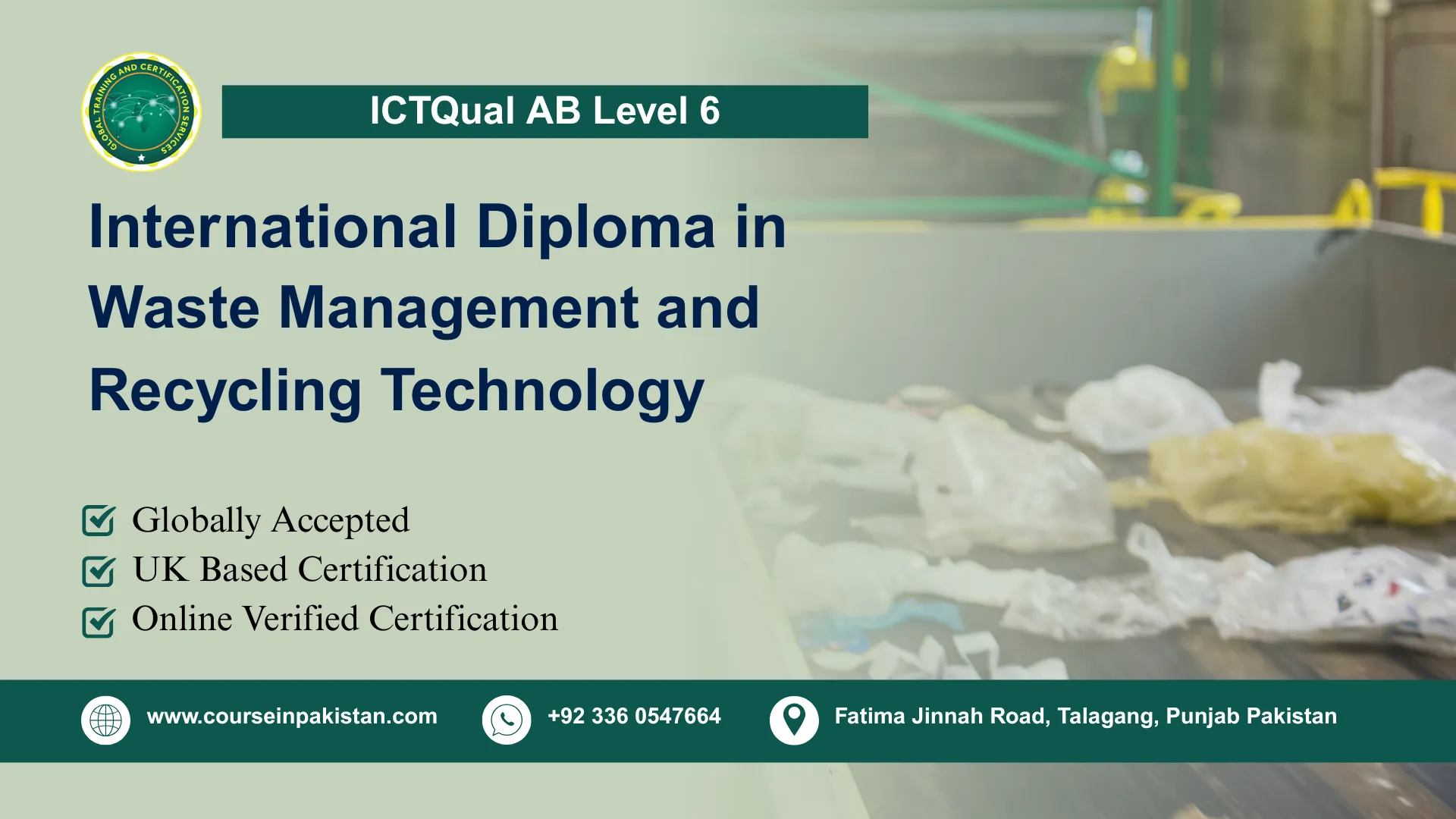
The ICTQual AB Level 6 International Diploma in Waste Management and Recycling Technology is a globally recognized qualification designed to equip learners with advanced knowledge and practical skills in waste management practices, recycling technologies, environmental protection, and sustainable resource utilization. This comprehensive program explores topics such as waste collection, segregation, recycling processes, hazardous waste handling, sustainability strategies, and regulatory compliance. Learners will gain the expertise to implement efficient waste management systems, improve recycling operations, and contribute to environmental sustainability at both organizational and community levels.
The course emphasizes practical application alongside theoretical understanding, preparing learners to design and manage effective waste management strategies, lead recycling initiatives, and implement sustainable solutions across diverse sectors. Participants will also develop problem-solving, strategic planning, and leadership skills, enabling them to make informed decisions in waste management operations and environmental projects.
Course Overview
The ICTQual AB Level 6 International Diploma in Waste Management and Recycling Technology is a comprehensive and globally recognized qualification designed to provide learners with advanced knowledge and practical skills in waste management, recycling technologies, environmental protection, and sustainable resource utilization. This 360-credit, fully assignment-based diploma allows learners to study at their own pace from anywhere in the world. It is British Council verificable and MOFA and Embassy attestable, making it highly suitable for employment, career advancement, and iqama approval. The course combines theoretical understanding with practical application, enabling learners to design, manage, and optimize waste management systems and recycling operations effectively.
This qualification is suitable for both fresh learners and experienced professionals. Fresh students are required to complete all 36 mandatory assignments within three years, while experienced and competent individuals with at least six years of relevant experience can complete the certification in a shorter time by submitting verifiable experience and defending their knowledge in professional discussion meetings with an ICTQual AB approved assessor, without completing all mandatory assignments. By the end of the program, learners will have developed the technical expertise, strategic planning skills, and leadership capabilities needed to take on senior roles in waste management, recycling, and environmental sustainability across industries, municipalities, and environmental organizations.
Key Highlights of the Course:
- Fully 360-credit Level 6 diploma, flexible and self-paced study
- British Council verificable and MOFA/Embassy attestable qualification
- Suitable for fresh learners and experienced professionals with accelerated pathways
- Focus on practical waste management skills, recycling technologies, and sustainability strategies
- Globally recognized for career advancement and iqama approval
Course Benefits
Career Advancement
- Prepare for managerial and leadership roles in waste management, recycling operations, and environmental services
- Enhance employability in government agencies, private industries, and NGOs focused on environmental sustainability
- Gain recognition for expertise in waste management and recycling technologies
Professional Recognition
- Obtain a British Council verified and MOFA/Embassy attestable qualification
- Validate professional experience and knowledge for career growth and iqama approval
- Strengthen credibility for international job placements in environmental sectors
Flexible Learning
- Complete the diploma entirely through assignments at your own pace
- Accelerated completion option for experienced professionals
- Study from anywhere in the world without strict classroom attendance
Practical Skills Development
- Learn to design and manage waste collection, recycling, and disposal systems
- Gain expertise in hazardous waste management, regulatory compliance, and sustainability practices
- Develop problem-solving, leadership, and strategic planning skills in environmental management
Academic and Professional Pathways
- Foundation for postgraduate studies in Environmental Science, Waste Management, or Sustainability Leadership
- Access to advanced certifications in recycling technologies, sustainability, or environmental compliance
- Opportunities to join global professional networks and career pathways in environmental management
Course Study Units
This qualification, the ICTQual AB Level 6 International Diploma in Waste Management & Recycling Technology, consists of 36 mandatory units.
Year 1 – Foundations of Waste Management & Recycling Technology
- Principles of Waste Management
- Introduction to Environmental Science and Sustainability
- Waste Legislation and Regulatory Compliance
- Waste Hierarchy and Circular Economy Concepts
- Hazardous and Non-Hazardous Waste Management
- Solid Waste Collection and Transportation Systems
- Recycling Technologies and Processes
- Water and Air Quality in Waste Management
- Occupational Health, Safety, and Environmental Awareness
- Environmental Communication and Reporting
- Professional Ethics in Waste Management
- Introduction to Project Planning in Waste Management
Year 2 – Applied Waste Management & Recycling Practices
- Advanced Waste Treatment and Processing Techniques
- Industrial Waste Management
- Hazardous Waste Handling and Disposal
- Waste-to-Energy Technologies
- Resource Recovery and Sustainable Practices
- Environmental Monitoring and Audit Techniques
- Waste Management in Manufacturing and Commercial Sectors
- Digital Tools and Technologies in Waste Management
- Environmental Risk Assessment and Management
- Behavioural and Organisational Approaches to Waste Safety
- Research Methods for Waste and Recycling Projects
- Project Implementation and Operational Planning
Year 3 – Strategic Leadership in Waste Management & Recycling
- Strategic Waste Management and Governance
- Integrated Environmental Management Systems (ISO 14001, ISO 50001)
- Policy Development and Implementation in Waste Management
- Sustainability Leadership and Corporate Social Responsibility (CSR)
- Environmental Risk Management in Large-Scale Projects
- Renewable Energy Integration in Waste Management
- International Waste Management Standards and Best Practices
- Innovation and Emerging Technologies in Recycling
- Environmental Crisis Management and Emergency Planning
- Advanced Occupational Health & Environmental Wellbeing Strategies
- Independent Research Project in Waste Management & Recycling
- Capstone Project: Applied Waste Management & Recycling Technology
Learning Outcomes
Year 1 – Foundations of Waste Management & Recycling Technology
Principles of Waste Management
- Understand core concepts and objectives of waste management
- Analyze different types of waste and their environmental impacts
- Apply waste management strategies to reduce environmental harm
Introduction to Environmental Science and Sustainability
- Understand key principles of environmental science
- Analyze sustainability concepts and their application in waste management
- Evaluate environmental challenges and sustainable solutions
Waste Legislation and Regulatory Compliance
- Understand national and international waste regulations
- Apply legal frameworks to waste management practices
- Evaluate compliance strategies for organizational operations
Waste Hierarchy and Circular Economy Concepts
- Understand the principles of waste hierarchy and circular economy
- Apply reduction, reuse, and recycling strategies
- Evaluate sustainable resource management practices
Hazardous and Non-Hazardous Waste Management
- Identify hazardous and non-hazardous wastes
- Apply safe handling, storage, and disposal procedures
- Evaluate risk management strategies for different waste types
Solid Waste Collection and Transportation Systems
- Understand collection and transportation methods for solid waste
- Apply logistical planning and operational management principles
- Evaluate efficiency and environmental impact of waste collection systems
Recycling Technologies and Processes
- Understand different recycling technologies and their applications
- Apply processes for material recovery and reuse
- Evaluate the efficiency and sustainability of recycling systems
Water and Air Quality in Waste Management
- Assess the impact of waste management on water and air quality
- Apply monitoring and mitigation strategies for environmental protection
- Evaluate compliance with environmental standards
Occupational Health, Safety, and Environmental Awareness
- Understand health and safety risks in waste management operations
- Apply safety procedures and environmental protection practices
- Evaluate workplace compliance and safety performance
Environmental Communication and Reporting
- Develop strategies for effective environmental communication
- Prepare reports on waste management activities and sustainability initiatives
- Evaluate the effectiveness of stakeholder engagement and reporting
Professional Ethics in Waste Management
- Understand ethical principles in waste management and recycling
- Apply professional responsibility in operational decision-making
- Evaluate ethical challenges and solutions in environmental management
Introduction to Project Planning in Waste Management
- Understand project management principles for waste management initiatives
- Plan and monitor environmental projects effectively
- Evaluate project feasibility, risk, and resource allocation
Year 2 – Applied Waste Management & Recycling Practices
Advanced Waste Treatment and Processing Techniques
- Understand advanced methods for waste treatment and processing
- Apply technologies for efficient waste reduction and recovery
- Evaluate operational performance of treatment processes
Industrial Waste Management
- Identify industrial waste types and impacts
- Apply management strategies for safe disposal and recycling
- Evaluate compliance with industrial environmental standards
Hazardous Waste Handling and Disposal
- Apply safe procedures for handling hazardous waste
- Develop disposal strategies that meet regulatory requirements
- Evaluate risk management practices for hazardous waste operations
Waste-to-Energy Technologies
- Understand technologies for converting waste to energy
- Apply systems for energy recovery from waste streams
- Evaluate environmental and economic benefits of waste-to-energy solutions
Resource Recovery and Sustainable Practices
- Implement techniques for resource recovery from waste
- Apply sustainable waste management practices in organizations
- Evaluate the efficiency and environmental impact of recovery strategies
Environmental Monitoring and Audit Techniques
- Conduct environmental audits for waste management operations
- Apply monitoring tools to assess environmental performance
- Evaluate compliance and operational effectiveness
Waste Management in Manufacturing and Commercial Sectors
- Understand sector-specific waste management challenges
- Apply operational strategies for sustainable waste handling
- Evaluate organizational practices for efficiency and compliance
Digital Tools and Technologies in Waste Management
- Use digital tools for monitoring and managing waste operations
- Apply emerging technologies to optimize recycling and treatment
- Evaluate technology adoption for environmental and operational benefits
Environmental Risk Assessment and Management
- Identify risks associated with waste management operations
- Apply risk assessment frameworks and mitigation strategies
- Evaluate effectiveness of risk management plans
Behavioural and Organisational Approaches to Waste Safety
- Understand organizational behavior and culture in waste management
- Apply behavioral strategies to improve workplace safety and compliance
- Evaluate effectiveness of organizational interventions
Research Methods for Waste and Recycling Projects
- Apply qualitative and quantitative research methods
- Collect and analyze data to inform waste management strategies
- Develop evidence-based recommendations for operational improvement
Project Implementation and Operational Planning
- Plan, implement, and monitor waste management projects
- Apply operational management principles to real-world scenarios
- Evaluate project outcomes for efficiency, impact, and sustainability
Year 3 – Strategic Leadership in Waste Management & Recycling
Strategic Waste Management and Governance
- Develop strategic plans for organizational waste management
- Apply governance frameworks to ensure compliance and effectiveness
- Evaluate long-term sustainability and operational performance
Integrated Environmental Management Systems (ISO 14001, ISO 50001)
- Understand principles and implementation of environmental management systems
- Apply ISO standards to organizational operations
- Evaluate system performance and compliance outcomes
Policy Development and Implementation in Waste Management
- Develop waste management policies aligned with environmental goals
- Implement policies effectively within organizations or communities
- Evaluate policy impact and compliance
Sustainability Leadership and Corporate Social Responsibility (CSR)
- Apply leadership principles in sustainability initiatives
- Develop CSR strategies aligned with environmental objectives
- Evaluate effectiveness of leadership and CSR programs
Environmental Risk Management in Large-Scale Projects
- Identify and assess risks in large-scale waste management projects
- Apply risk mitigation and monitoring strategies
- Evaluate operational resilience and environmental impact
Renewable Energy Integration in Waste Management
- Understand opportunities for integrating renewable energy in waste operations
- Apply strategies for energy recovery and efficiency improvement
- Evaluate benefits and challenges of renewable integration
International Waste Management Standards and Best Practices
- Understand global standards and practices in waste management
- Apply international guidelines to local or organizational contexts
- Evaluate compliance and operational performance against best practices
Innovation and Emerging Technologies in Recycling
- Identify innovative approaches to improve recycling operations
- Apply emerging technologies for material recovery and waste reduction
- Evaluate operational, environmental, and economic benefits
Environmental Crisis Management and Emergency Planning
- Develop strategies for responding to environmental crises
- Apply emergency planning and risk mitigation frameworks
- Evaluate effectiveness of crisis management strategies
Advanced Occupational Health & Environmental Wellbeing Strategies
- Implement advanced health, safety, and wellbeing practices in waste management
- Apply strategies to improve environmental conditions for workers
- Evaluate outcomes for operational safety and employee wellbeing
Independent Research Project in Waste Management & Recycling
- Conduct independent research addressing a relevant environmental or waste management issue
- Apply research methodologies to analyze data and propose solutions
- Present findings and recommendations for practical application
Capstone Project: Applied Waste Management & Recycling Technology
- Integrate knowledge and skills from the entire program into a practical project
- Plan, implement, and evaluate a comprehensive waste management or recycling initiative
- Demonstrate competence in strategic planning, leadership, and operational management
Who is This Course For?
Aspiring Environmental Professionals
- Individuals seeking to start a career in waste management, recycling, or environmental sustainability
- Fresh graduates aiming to gain a globally recognized qualification in waste management technologies
Experienced Practitioners
- Professionals working in municipal waste management, industrial waste operations, or environmental services
- Individuals looking to enhance strategic leadership, operational management, and recycling expertise
Independent and Self-Motivated Learners
- Learners who prefer flexible, self-paced, assignment-based study
- Individuals capable of completing assessments remotely from anywhere in the world
Future Leaders and Strategists
- Learners aspiring to senior management or executive roles in waste management and recycling
- Professionals aiming to lead sustainability initiatives, corporate social responsibility (CSR) programs, and environmental projects
Globally Oriented Professionals
- Individuals seeking a qualification verified by the British Council and attestable by MOFA/Embassy
- Professionals targeting iqama approval or international career opportunities in waste management and sustainability
Future Progression
- Leadership and senior management roles in waste management, recycling operations, and environmental sustainability
- Strategic positions in government agencies, NGOs, municipal services, and private industries
- Consultancy opportunities in waste reduction, recycling technology, and sustainability strategies
- Opportunities to lead research, training, and implementation of environmental projects
- Pathways to global roles requiring professional recognition and attestable qualifications
Academic Pathways:
- Progression to postgraduate studies in Environmental Science, Waste Management, or Sustainability Leadership
- Advanced professional certifications or diplomas in recycling technologies, environmental compliance, or Sustainability Management
- Specialization programs in circular economy, renewable energy integration, or sustainable resource management
- Access to professional networks and training programs for continued career growth in environmental sectors
Conclusion
The ICTQual AB Level 6 International Diploma in Waste Management & Recycling Technology is a flexible, globally recognized qualification designed for both fresh learners and experienced professionals. With 36 mandatory units and 360 credits, the course develops advanced knowledge and practical skills in waste management, recycling technologies, environmental compliance, and sustainability leadership. Fresh learners complete all assignments within three years, while experienced professionals with relevant experience can complete the program in a shorter time through professional discussion assessments. Verified by the British Council and attestable by MOFA and Embassy, this diploma equips learners with the expertise, credentials, and confidence to take leadership roles in municipal, industrial, and environmental sustainability projects, enhancing career prospects both locally and internationally.

